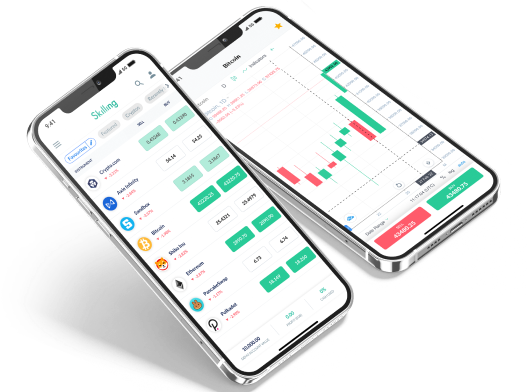As the saying goes, "no risk, no reward." However, with the increasing volatility and uncertainty in the markets, more investors are seeking for the safer options available that will still be rewarding. As a trader, protecting your capital is crucial, and one way to do that is by investing in safer options.
Experience Skilling's award-winning platform
Try out any of Skilling’s trading platforms on the device of your choice across web, android or iOS.

How to measure risk for your investment
Investing in any market can be a risky venture, but there are ways to calculate and measure the risk that comes with it. One of the most common measures of risk is volatility. In simpler terms, volatility is the degree of change in an asset's price over a certain period. When an asset's volatility is high, it means that the price can swing drastically, making it a high-risk investment. On the other hand, when volatility is low, the price is more stable, and hence considered a safer investment.
Another measure of risk is the Sharpe ratio, which compares the returns of an investment to its risk. It takes into account the volatility of the investment, as well as the risk-free rate of return. In other words, it helps to determine if the returns of an investment are worth the risk. The higher the Sharpe ratio, the better it is for the investment.
What investments are safer?
When it comes to safer investments, here are some options to consider:
- Treasury bills, notes, and bonds: These are considered safe investments as they are backed by the U.S. government. They offer a low risk of default and are highly liquid.
- Money market mutual funds: These funds invest in low-risk, short-term debt securities, such as Treasury bills and commercial paper. They provide stability and easy access to your funds.
- Treasury Inflation-Protected Securities (TIPS): TIPS are government bonds that are designed to protect against inflation. They also offer a return and are considered as safe investments in comparison to other investments.
- High-yield savings accounts: These accounts offered by banks typically provide a higher interest rate than traditional savings accounts while still maintaining a high level of safety and liquidity.
- Series I savings bonds: These bonds issued by the U.S. Department of the Treasury offer a fixed interest rate plus an inflation adjustment. They are considered to be safer in comparison to other investments but have lower liquidity compared to other options.
- Certificates of deposit (CDs): CDs are time deposits with fixed interest rates and specific maturity dates. They offer higher returns than regular savings accounts but have limited liquidity until the maturity date.
- Investment-grade corporate bonds: These bonds are issued by companies with strong credit ratings. While they carry a moderate level of risk, they generally offer higher yields compared to government bonds.
Why are safer investments important for traders?
Safer investments are important for traders for several reasons:
- Preservation of capital: They help protect the trader's capital from significant losses. By choosing investments with lower risk, traders could minimise the potential for substantial financial downturns.
- Risk management: They allow traders to manage their risk exposure effectively. By diversifying their portfolio with safe assets, traders could balance higher-risk investments and mitigate the overall risk in their portfolio.
- Stability during market turbulence: Safe investments, often referred to as safe havens, tend to perform well during times of market volatility and economic uncertainty. They provide stability and a potential hedge against market downturns.
- Peace of mind: Investing in safer assets can provide traders with peace of mind and reduce anxiety about potential losses. This psychological aspect is crucial for maintaining a disciplined investment strategy.
- Liquidity: Many safe investments offer high liquidity, meaning traders can easily buy or sell them without causing significant price fluctuations. This allows traders to access their funds quickly if needed.
- Long-term perspective: They are particularly important for traders with a long-term perspective. By focusing on preserving capital, they can stay invested in the market over the long term and benefit from compounding returns.
What's your Trading Style?
No matter the playing field, knowing your style is the first step to success.

FAQs
1. What are safe investments?
They are financial instruments that are considered low-risk and have a higher likelihood of preserving capital. These investments prioritise stability and security over high returns.
2. Why should I consider safe investments?
They provide protection against potential losses, especially during market downturns or economic uncertainties. They are suitable for individuals seeking to preserve their capital and prioritise stability over aggressive growth.
3. What are some examples of safe investments?
Examples of safe investments include Treasury bills, notes, and bonds, money market mutual funds, certificates of deposit (CDs), high-yield savings accounts, and investment-grade corporate bonds.
4. Are safe investments completely risk-free?
While they generally carry lower risk, they are not entirely risk-free. All investments come with some level of risk, even if it is minimal. It's essential to understand the risks associated with each investment and diversify your portfolio.
5. Do safe investments offer high returns?
They typically offer lower returns compared to higher-risk investments. The primary focus of safe investments is capital preservation rather than maximising returns. However, they can still provide steady and consistent income over time.
6. Can safe investments provide liquidity?
Many safe investments, such as money market funds and high-yield savings accounts, offer high liquidity. They allow investors to access their funds quickly and easily without incurring significant penalties or restrictions.
7. How do I determine the safety of an investment?
Factors to consider when assessing the safety of an investment include the creditworthiness of the issuer, historical performance, market conditions, diversification, and the level of government backing or guarantees.
8. Should I solely invest in safe investments?
The decision to invest solely in safe investments depends on your financial goals, risk tolerance, and time horizon. While safe investments provide stability, a well-diversified portfolio typically includes a mix of safe and higher-risk investments to achieve long-term financial objectives.
9. Can I lose money with safe investments?
While the risk of losing money is lower with safe investments compared to higher-risk options, there is still a possibility of loss. Factors such as inflation, changes in interest rates, or credit default could impact the value of safe investments.











